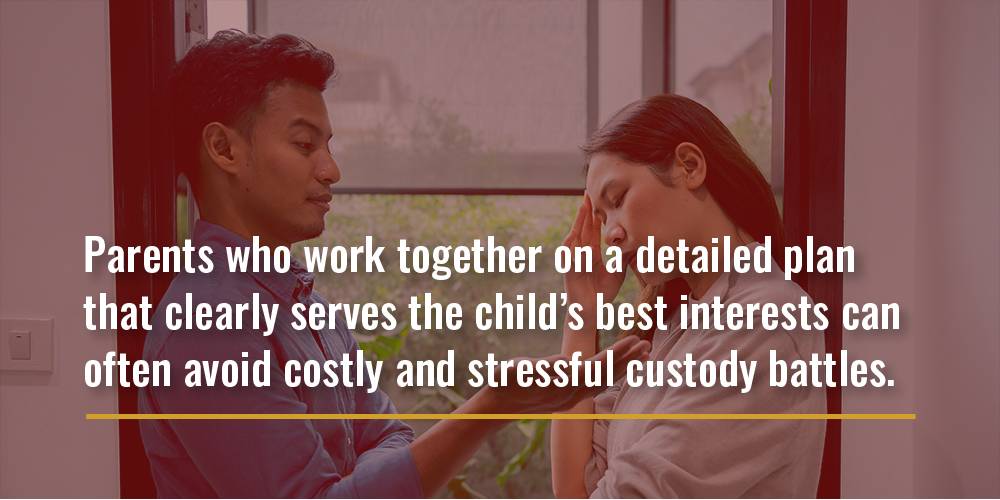 630-393-3111
630-393-3111
4200 Cantera Drive, Suite 200 | Warrenville, IL 60555
Can You Really Write Your Own Child Custody Agreement?
 In Illinois, you can write your own child custody agreement, called a parenting plan. However, you have to follow state law if you want a judge to approve it. Writing your own plan means that you have more control over the process and your family’s future. It can also help you avoid long, stressful court battles. If you do not understand what the law requires, it is easy to make mistakes that can delay or block approval. Our Naperville, IL child custody lawyer can help you create an agreement that serves your child’s best interests and meets all the legal standards.
In Illinois, you can write your own child custody agreement, called a parenting plan. However, you have to follow state law if you want a judge to approve it. Writing your own plan means that you have more control over the process and your family’s future. It can also help you avoid long, stressful court battles. If you do not understand what the law requires, it is easy to make mistakes that can delay or block approval. Our Naperville, IL child custody lawyer can help you create an agreement that serves your child’s best interests and meets all the legal standards.
What Does Illinois Law Say About Parenting Plans?
A parenting plan explains how parents will share time with their children and how they will make important decisions about things like education, health care, and religion. Every parenting plan must include two main parts. The parental responsibilities section, often called legal custody, refers to the decision-making aspect of parenting. The other section covers visitation, otherwise known as parenting time.
If you and your co-parent can agree on these terms, you can write your own plan, sign it, and submit it to the court. Judges usually support parenting plans that both parents create together, as long as they are legally acceptable. They just must focus on the child’s best interests, which is the standard under 750 ILCS 5/602.7. This law ensures that your plan supports your child’s physical health, emotional stability, and overall development.
If you and the other parent cannot agree, each of you must submit your own proposed plan. The court may then order mediation or hold a hearing to decide how to divide parenting time and responsibilities.
What Do You Have To Include in a Valid Illinois Parenting Plan?
The law gives parents flexibility when creating a plan, but there are some details you must include. Under 750 ILCS 5/602.10, every valid parenting plan should cover specific areas that help avoid confusion and conflict later:
-
Decision-making responsibilities for your child’s education, healthcare, religion, and extracurricular activities
-
A schedule that shows when the child will be with each parent, including weekdays, weekends, holidays, school breaks, and vacations
-
Transportation and exchanges, such as where and how the child will be picked up and dropped off
-
Communication rules, including how and when the parents and child can talk to each other during the other parent’s time
-
Dispute resolution steps, such as agreeing to use mediation before going back to court
-
Future changes, explaining how you will handle modifications if one parent moves or the child’s needs change
The more specific you are, the better it is for your plan. For example, do not just say "parents will share holidays." Instead, list which holidays you each get and the exact start and end times. Clear details make it easier to follow the plan and avoid misunderstandings.
Common Mistakes Parents Make When Writing Their Own Custody Agreement
Writing your own parenting plan can save money and help reduce conflict, but it is easy to make errors. Some parents use vague language that causes problems later. Others forget to explain transportation or exchange arrangements, assuming they will figure it out at a later date.
Another mistake is ignoring future changes. For example, what happens if one parent gets a new job or moves to a different city? Without clear terms, parents can end up back in court. Remember, the focus is on what is best for your child, and that sometimes means that your plans might have to be a little less convenient for you. Judges always look at custody agreements from the child’s point of view.
Examples of Common Parenting Plans in Illinois
There is no universally perfect parenting schedule in Illinois. The best plan for your family depends on your child’s age, school schedule, and relationship with each parent. Some examples of plans that Illinois courts often approve are:
-
Alternating weeks: The child lives with one parent for a week, then switches to the other parent for the next week.
-
2-2-3 schedule: The child spends two days with one parent, two days with the other, and then three days back with the first parent. The pattern alternates weekly.
-
School-year and summer split: One parent has most of the school year, and the other has longer visits during school breaks and summer.
-
Primary home with visitation: The child lives mainly with one parent, and the other parent has weekends or midweek visits.
There are many ways to customize a parenting plan to suit your family’s needs. Babies and toddlers often need shorter, more frequent visits to maintain a strong bond with both parents. Older children and teens may prefer fewer transitions between homes so they can focus on school, activities, and their social lives. What matters most is that the schedule supports your child’s stability and allows both parents to stay involved.

What Happens if the Judge Rejects Your Custody Agreement?
Judges can reject a parenting plan for many reasons. For example, if your plan is unclear, missing details, or gives too much control to one parent, the judge may ask you to make changes. Sometimes, the court will explain what must be fixed so you can adjust and resubmit the plan. If there are serious problems, like safety concerns or instability, the judge may reject the plan completely. The court can then require mediation or, in some cases, create its own plan. Having an attorney review your agreement before filing can help avoid these issues and keep the process moving smoothly.
Contact a DuPage County, IL Parental Responsibilities Attorney Today
The lead attorney at Calabrese Associates, P.C. brings extensive experience in family law matters. As a former chair of the DuPage County Bar Association Family Law Committee, he helps shape how custody issues are handled in local courts. He also lectures on family law topics, giving clients the benefit of his insight into current legal trends and parenting law developments.
If you are creating or updating a parenting plan, legal guidance can make a significant difference. Contact our Naperville, IL child custody lawyer today at 630-393-3111 to schedule a consultation and ensure that your agreement meets all Illinois legal standards.


 4200 Cantera Drive, Suite 200, Warrenville, IL 60555
4200 Cantera Drive, Suite 200, Warrenville, IL 60555 630-393-3111
630-393-3111





